From fridgie to footy
Until May 27, 2025, Mani Liddy was a fridgie working for O’Connors in South Australia. The next day, he became an AFL footballer.
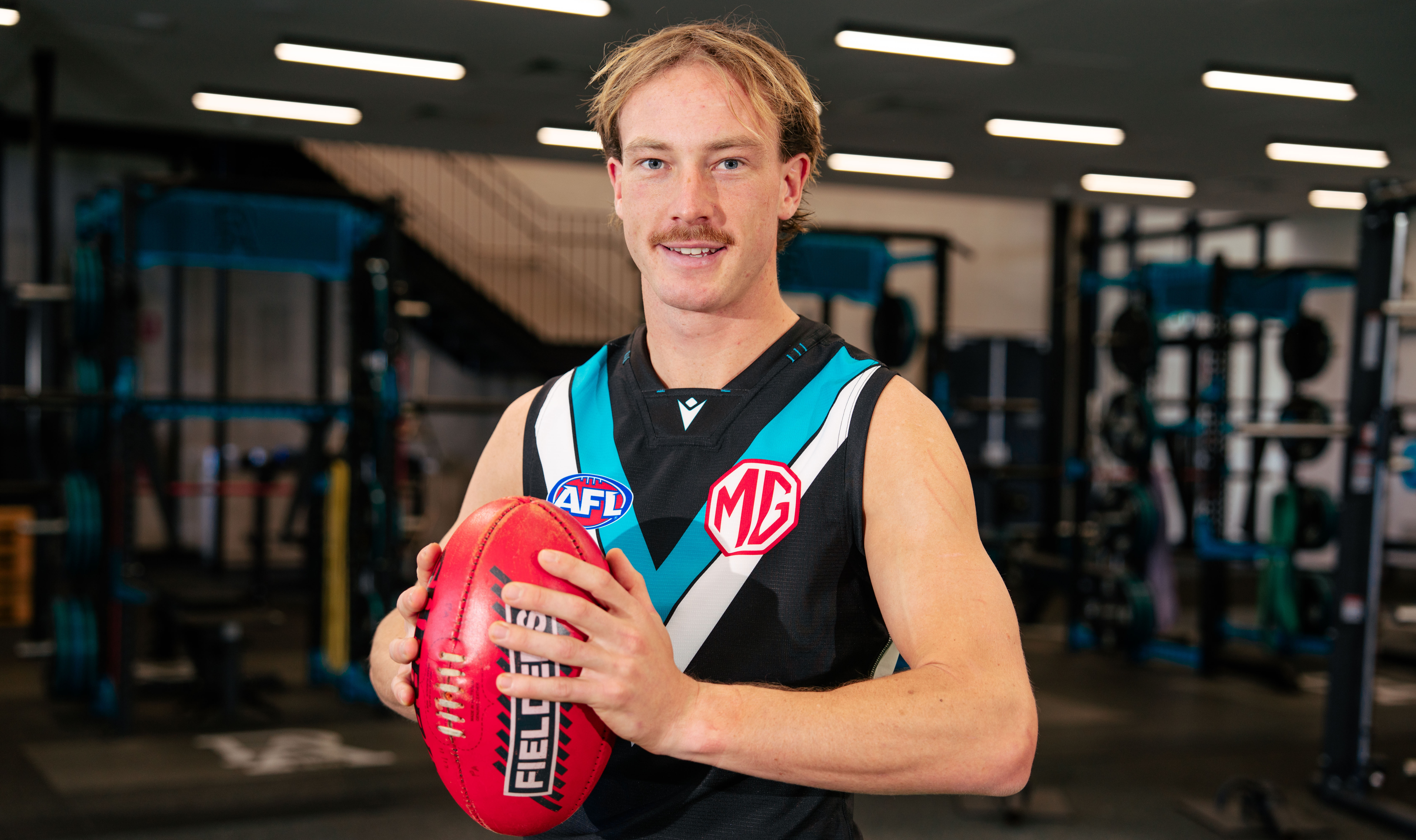
Most people would be ecstatic to realise their childhood dream, especially when it hasn’t come easily. But when Port Adelaide called Mani Liddy’s name out in the 2025 AFL mid-season draft, he didn’t take long to soak it in before getting back to business.
“It was a bit of a relief for half a day,” Liddy says of his reaction to being drafted. “But I’m a realist and this was the next step in my journey, so it was straight back to work – I didn’t really celebrate it that much.
“I just want to work as hard as I can and get the most out of the opportunity.”
Putting in the extra shift
Working hard is nothing new to Liddy. In the five years before he was drafted, he worked up to six days per week as a refrigeration and air conditioning technician, while also moonlighting as a professional footballer for Sturt and then Central District in the SANFL, one level below the AFL.
“We’d leave home anywhere between 5.30am and 7am in the morning, and I often wouldn’t get home until 9pm,” Liddy says.
“I’d go to work from 7am to 4pm, then it was straight to training from 5–8pm. That was three times a week, then on my days off I’d have to do weights sessions as well, then I’d play on the weekends. They were long days.
“You don’t have a lot of time to do any meal prep or cooking, so I was lucky to have really good support from my family. My mum and sisters always made a little bit extra for me, which was nice.”
And while being an AFL player comes with its own set of physical and psychological demands, Liddy says his work as a fridgie has given him some important perspective on his new career.
“I definitely think having to go out and earn your money by working a ‘real’ job has set me up really well,” Liddy says. “You don’t take for granted the amount of hours you put in at a normal job compared to AFL.
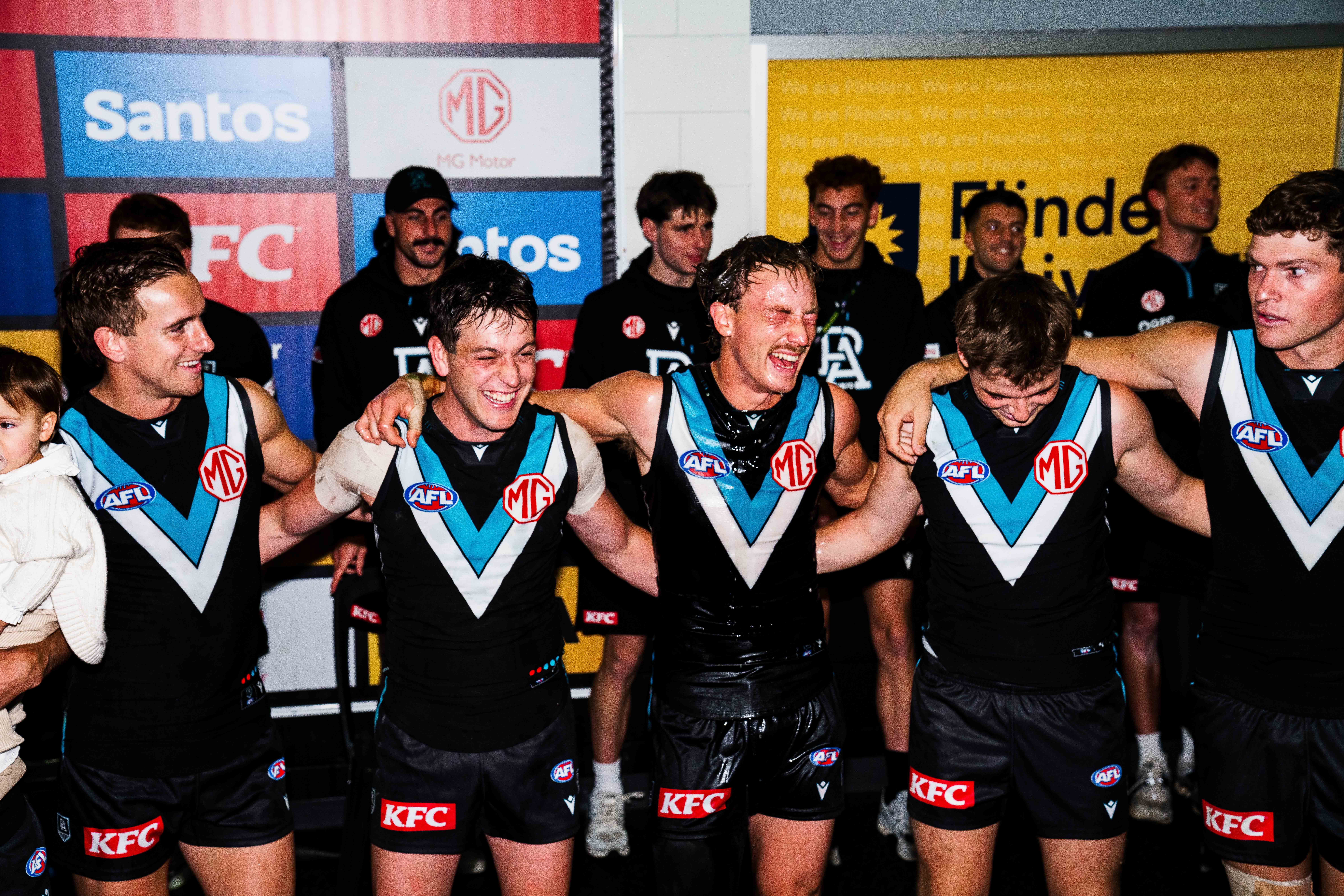

“Being an AFL player is definitely not laid back, but you don’t have those taxing physical days before you have to go to training or games. So I definitely appreciate the lifestyle.”
Right fit, right time
Becoming a fridgie wasn’t necessarily part of Liddy’s plan, but it wasn’t an accident, either. The goal was always to become an AFL footballer, but despite captaining South Australia at underage level, he was overlooked in his draft year.
Not one to let disappointment get the best of him, Liddy took stock of his options and decided to find a job he loved doing, while also striving to improve as a footballer.
“Straight out of school I knew I didn’t want to go to uni, so I hunted around and did a bit of work experience,” he says.
“I did some carpentry and tiling when I was at school, and after I finished I went and did a bit of trades assistant work with some diesel mechanics, working on cranes and trucks and cars. I didn’t really like that because you’re in a warehouse all day and I prefer to move around.”
Liddy wanted a job that was varied, challenging, and gave him the opportunity to go to new places and see new things. That’s when refrigeration came calling.
“My uncle was the service manager at O’Connors, and he suggested that I come and do some work experience,” Liddy says.
“A week was enough for me to be content with refrigeration as my trade.”
Mani Liddy
Ticking all the boxes
They say variety is the spice of life, and Liddy certainly got to experience this during his five years as a fridgie.
In his first few years, he got to work on exciting projects at interesting locations, including university campuses and defence facilities. The latter opened Liddy’s eyes to how tough refrigeration could be, especially when it’s cold and you’re working outside.
“I was out there when I was a second-year apprentice,” he says. “That was a ‘welcome to the trade moment’ – it was the middle of winter and I was doing first-year jobs like painting and cutting, so it wasn’t the best.”
However, as Liddy evolved as a technician, so did the kind of work he got given.
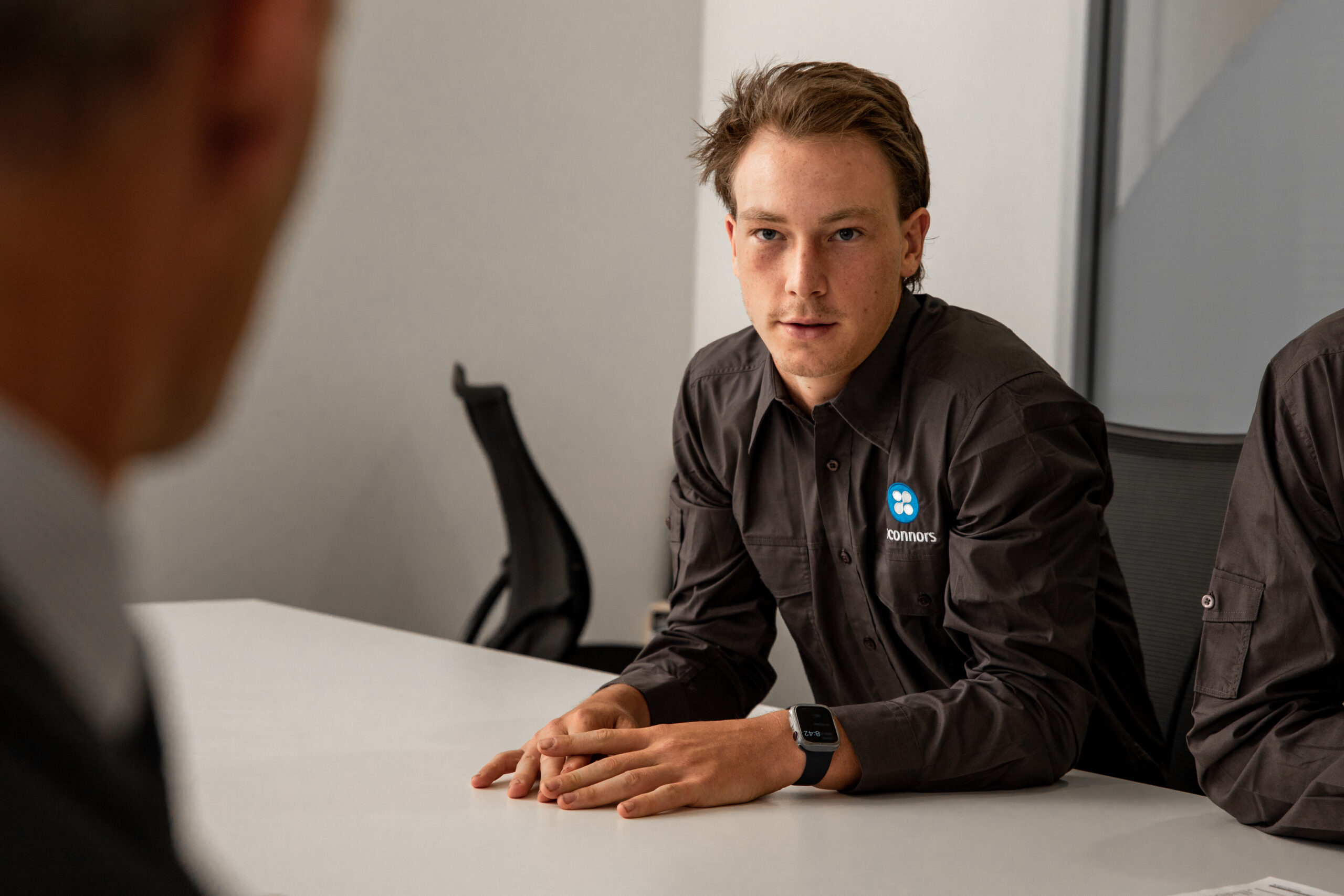

“As I got into my third and fourth year I moved into the city and started doing service work on high rises, which is what I was doing when I got drafted,” Liddy says.
No matter what tasks he was responsible for on any given day, he found the job challenging and satisfying in equal measure.
“Most days were pretty hard,” he says. “Winter is a bit quieter, but summers were flat out.
“There was also some weekend work. We used to do fire testing, so that was always available on Saturdays or after hours.”
Team-first philosophy
Russell Clayton was Liddy’s supervisor during his time at O’Connors. Clayton looks back fondly on Liddy’s development, both at work and on the footy field.
“Mani is a quiet yet quirky individual who brings a unique humour to the team,” Clayton says.
“Since starting as a first-year apprentice, Mani has shown incredible growth, both personally and professionally. This has shown in his career progression and also his football.”
Russell Clayton from O’Connors
He also identifies several qualities in Liddy that any AFL coach would surely be happy to add to their team.
“Throughout his time at O’Connors, Mani consistently demonstrated a strong work ethic and a genuine eagerness to learn,” Clayton says. “He was always there to assist when required.
“He is always very easy-going, fun, and has relaxed attitude to life – he’s been a great mate inside and outside of work!”
And while it’s always tough to lose a valued team member, Clayton and his colleagues couldn’t be happier for Liddy to be living out his childhood dream.
“It was a bit surreal really as it all happened so quick,” Clayton says. “One minute he was doing normal day-to-day work. and the next he was gone!
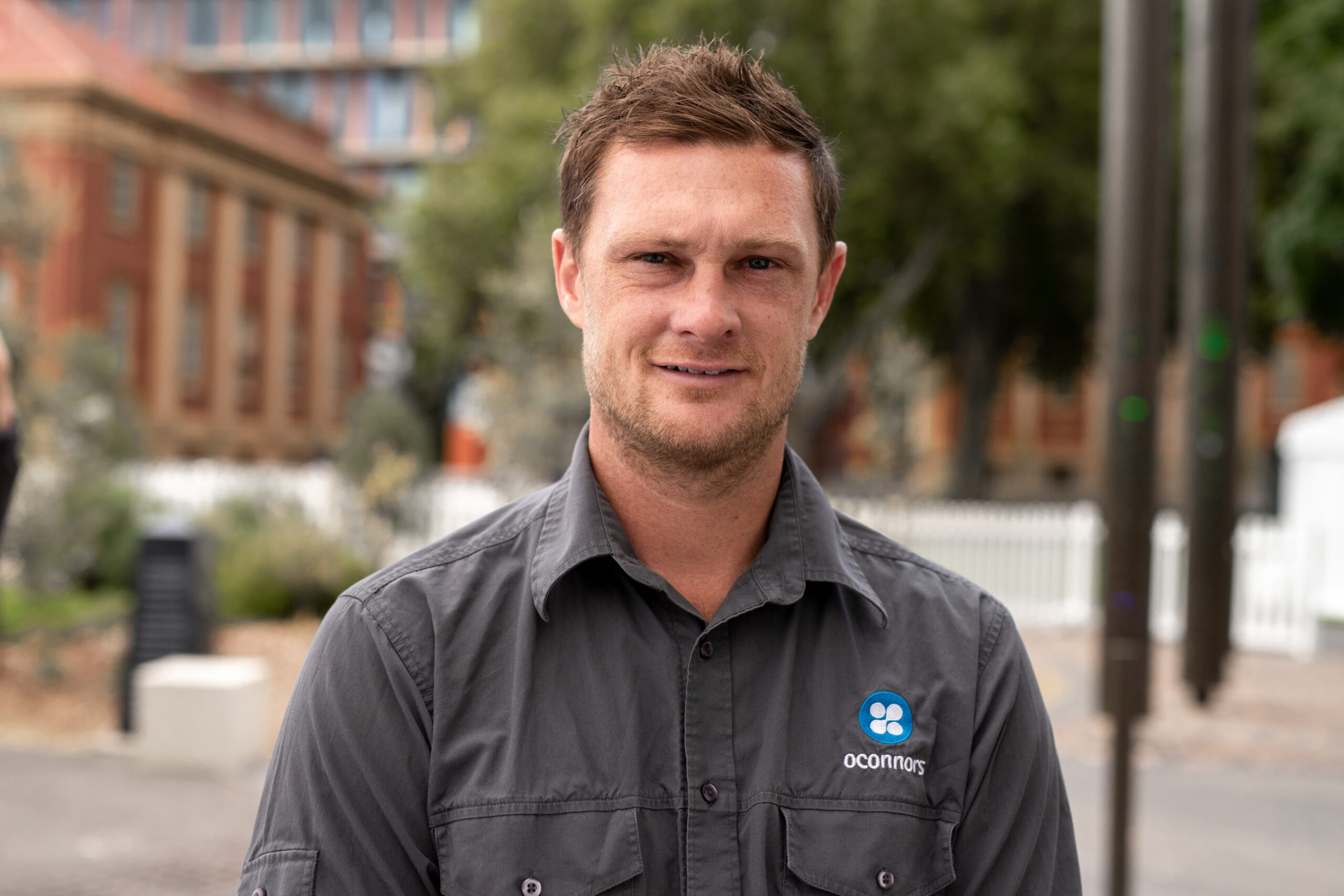

“Obviously everyone who knew and worked alongside Mani were all super excited, and there definitely was a bit of a buzz going around the company when it got announced. We are all proud of him and wish him all the best in this next chapter with Port Adelaide.”
Refrigeration, like footy, is a team game, and Liddy was thankful not to leave his colleagues in the lurch when he got drafted.
“At the time they had an extra technician floating around and they could cover my work quite comfortably!”
What’s a fridgie?
Almost overnight, Mani Liddy has become arguably Australia’s most recognisable refrigeration technician. So what did his new Port Adelaide teammates know about his former life as a fridgie?
Not much, as it turns out.
“I had to explain it to them a little bit,” Liddy says. “A few of them had half an idea of what I used to do, but most of them didn’t.
“A few of them asked whether I fixed fridges. I barely touched fridges!”
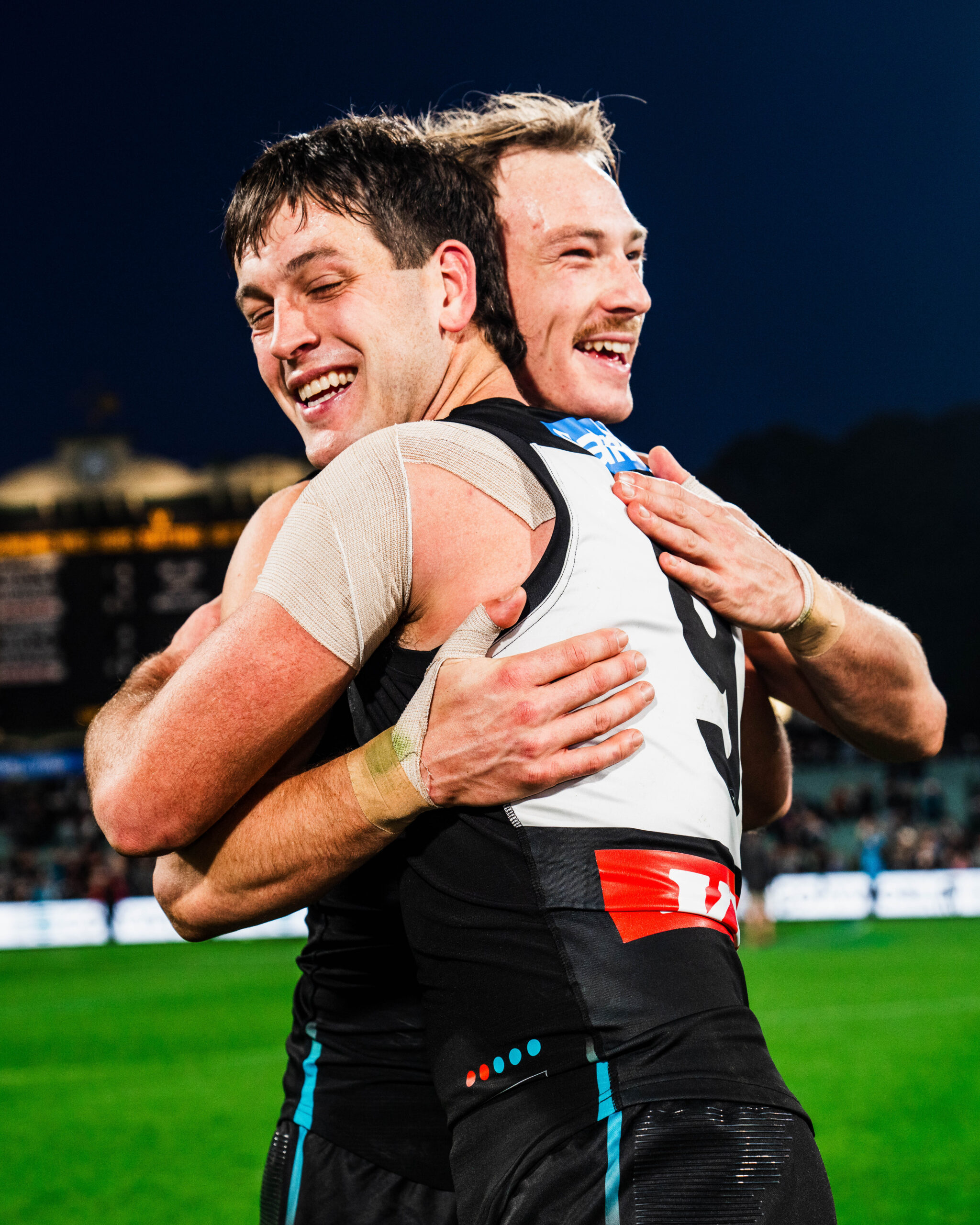

Transferrable skills
You might not think that refrigeration and footy have much in common, but Liddy says he learnt plenty during his time as a fridgie that extends well beyond the trade.
“Being a fridge tech in service, you build a lot of people skills – you have to deal with customers every day,” Liddy says. “I don’t think people realise the life skills you get out of it. I learnt so much in refrigeration – not just the actual trade skills, but doing my own quoting and seeing how things work in real life.”
Clayton agrees, highlighting the development in maturity he saw as Liddy grew into his work as a fridgie.
“The skills Mani has developed on the job – both technical and personal – will absolutely support him in his footy career,” Clayton says. “I think working in the HVAC industry would have provided him great life skills with being accountable and performing under pressure, especially during the summer period – as any fridgie would know.
“I think having that time to learn a trade and having that extra time to personally mature holds him in good stead for his football career. He will enjoy every minute, make the most of it and not take any second of it for granted!”
Liddy is particularly grateful for is the independence he got on the job, and the trust Clayton was willing to put in him from a young age.
“At O’Connors, we ran our own show – we did our own quoting and were responsible for keeping our customers up to date with what was happening in their buildings – so it has really helped with my people skills.
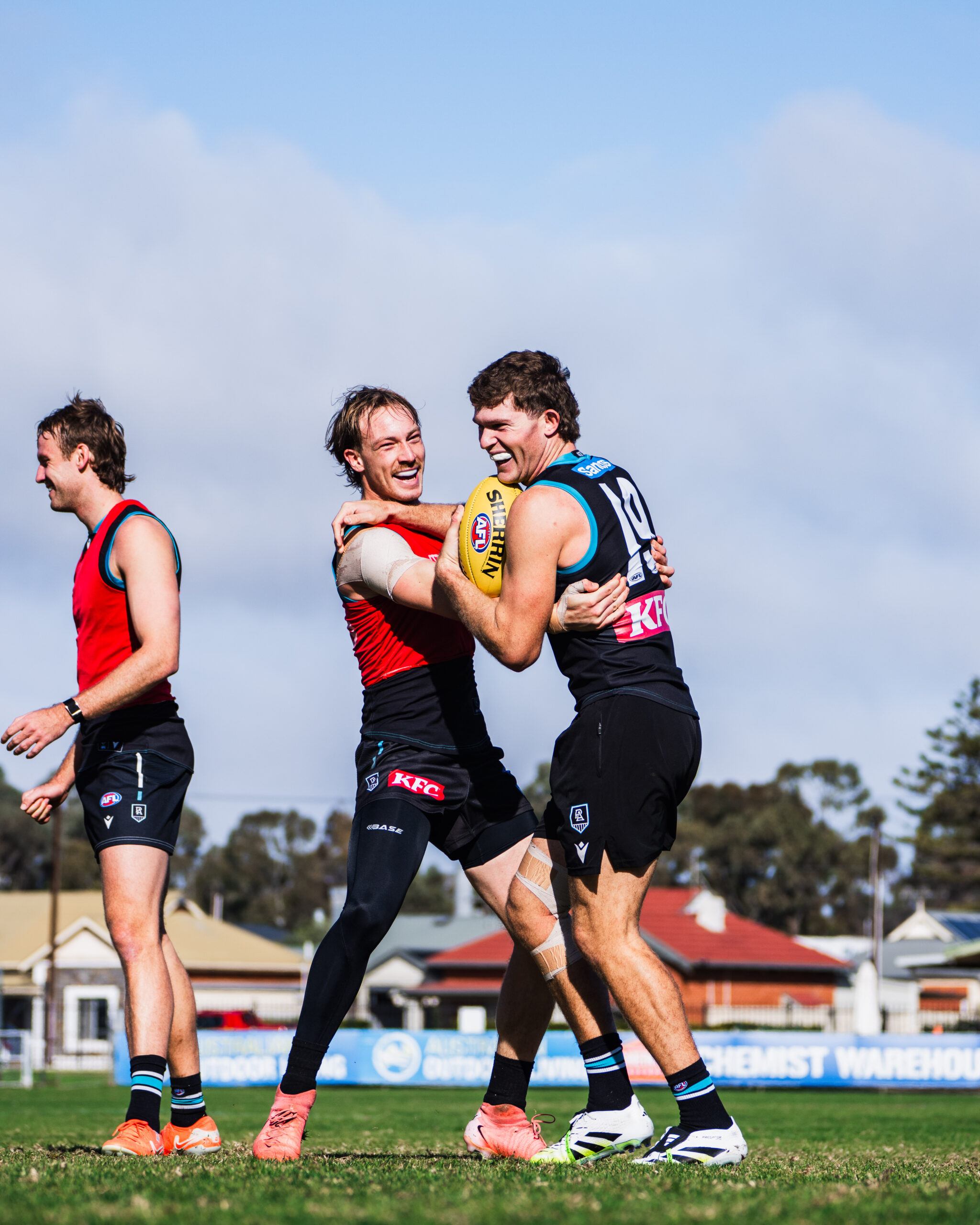

“My supervisor threw me in the deep end when I was a second-year, and that helped me a lot in the trade,” he says.
And while he always felt supported, he was encouraged to learn as much as possible and to trust his own judgment.
“He let me go look at jobs on my own,” Liddy says. “He told me to call him if I needed to, but to try and figure it out on my own if possible.
“I got to talk to customers on my own when I was 18 or 19, which really helped build my self-confidence.”
Mani Liddy
Now playing at the highest level in a sport where self-confidence is key to performance, Liddy’s years in the trade are paying dividends.
Strength in adversity
Somewhat ironically, Liddy’s darkest hour led to the eventual realisation of his AFL dream. It also ensured he’d be a cult figure from the moment he set foot on the field.
The injury came towards the back end of the 2024 season. It seemed completely innocuous – just a scratch to the side of the knee after tackling an opponent that drew a bit of blood. The medics cleaned and stitched up the wound, and Liddy played out the match.
But it was a wet and muddy day, and the wound had become infected. Standard antibiotics didn’t do the job – Liddy could barely walk on the Monday, and by the Tuesday he couldn’t put any weight on the leg at all.
When he went to hospital on the Wednesday, the infection had spread all the way up to his groin; he required two emergency surgeries to fully flush the infection out. He didn’t realise it at the time, but if Liddy had waited one more day to go to hospital, his leg would likely have been amputated.
The injury caused him to miss five games of footy, and it also left him unable to do his normal fridgie work while he was recovering.
“After I had the surgeries, I had to keep my leg straight for 10 days, so I missed just under two weeks of work,” Liddy says. “After I got the stitches out I came back on light duties for a week or two, because I couldn’t bend my knee or kneel.
“I guess those are the consequences of playing footy part-time and having to work full-time,” he adds with a laugh.
Nowadays, Liddy wears a black compression “sleeve” on his right leg to stop the weaker skin on his knee from bleeding during matches. Of the more than 10,000 people to play in the AFL over 130 years, he’s the first to sport this unique look.
But Liddy is proving to be much more than just a cult hero. The injury helped spur Liddy to improve his diet and fitness, which took his game to the next level and ultimately led to him getting drafted.
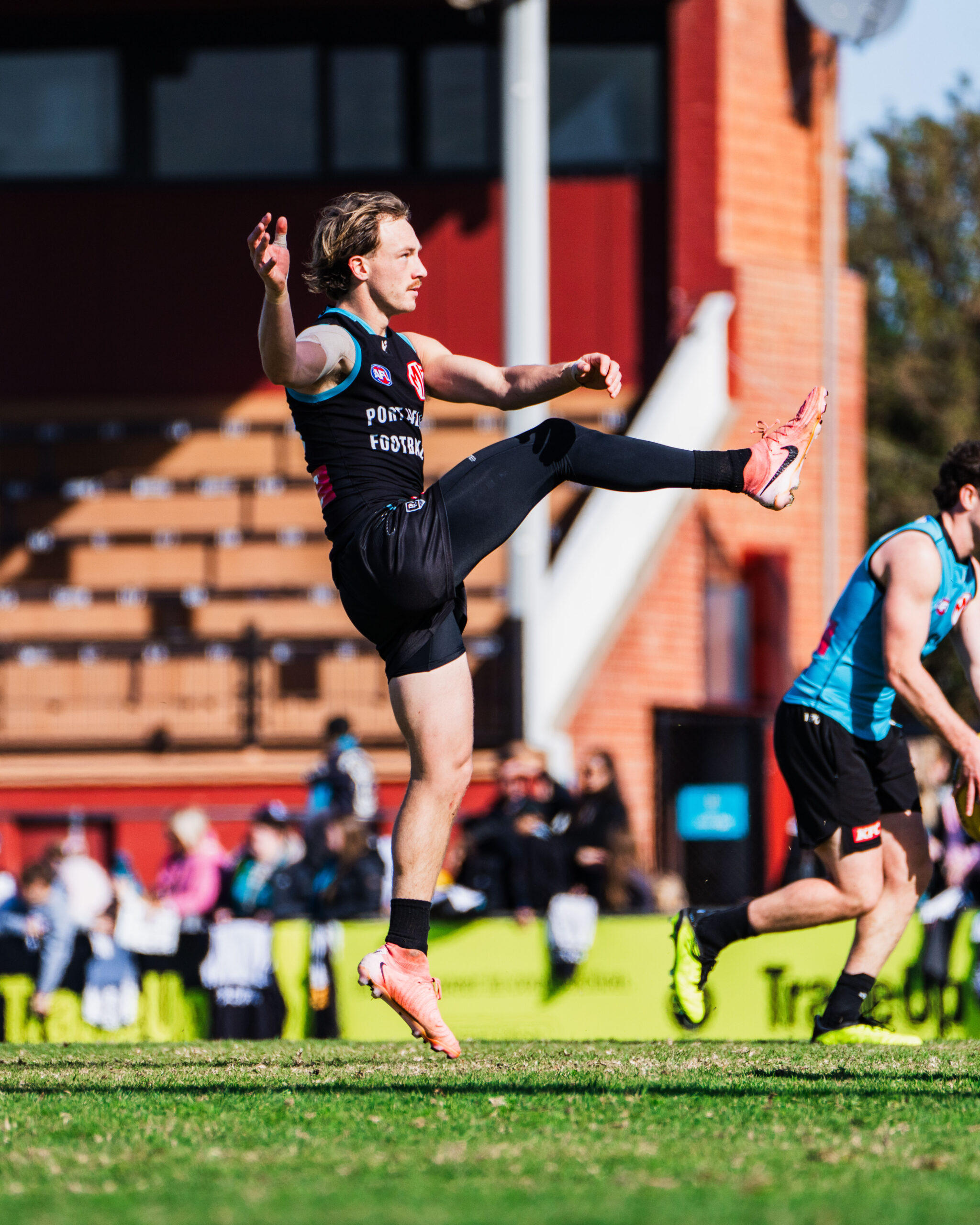

Port Adelaide’s new number 50 has quickly established himself in a midfield headlined by stars like Zak Butters, Jason-Horne Francis, Connor Rozee, and Willem Drew.
“Mani has continued to develop his game over the past few seasons after he made the move to Centrals from Sturt,” says Port Adelaide National Recruiting Manager Geoff Parker.
“This year, he has become a damaging midfielder who anticipates quickly to get into a position to receive. He is very clean below his knees and has shown that he can win the ball in the contest and has the endurance to work up and down the ground.”
The pursuit of happiness
Life after sport can be tough. Elite athletes who have the world at their feet can lose it all through one injury. Many find their career over by their early 20s, and even those who succeed rarely make it deep into their 30s. Without any work experience outside their sport, many struggle to readjust to the real world.
Liddy is rightfully focusing on the present and making the most of his opportunity as an AFL player. But he realises that his experience as a fridgie will help him land on his feet if the worst comes to the worst, and it’s a great career to return to down the track.
“I obviously want to play as long as I can – that’ll come down to how I look after my body and making sure I train the right way,” he says. “It’s nice to have something I can fall back on, but I’m hoping that’s not for another eight to 10 years!”
Liddy would encourage those who want an active and challenging career to consider a trade. He’d also encourage them not to rush their decision and make sure they find the trade that works for them.
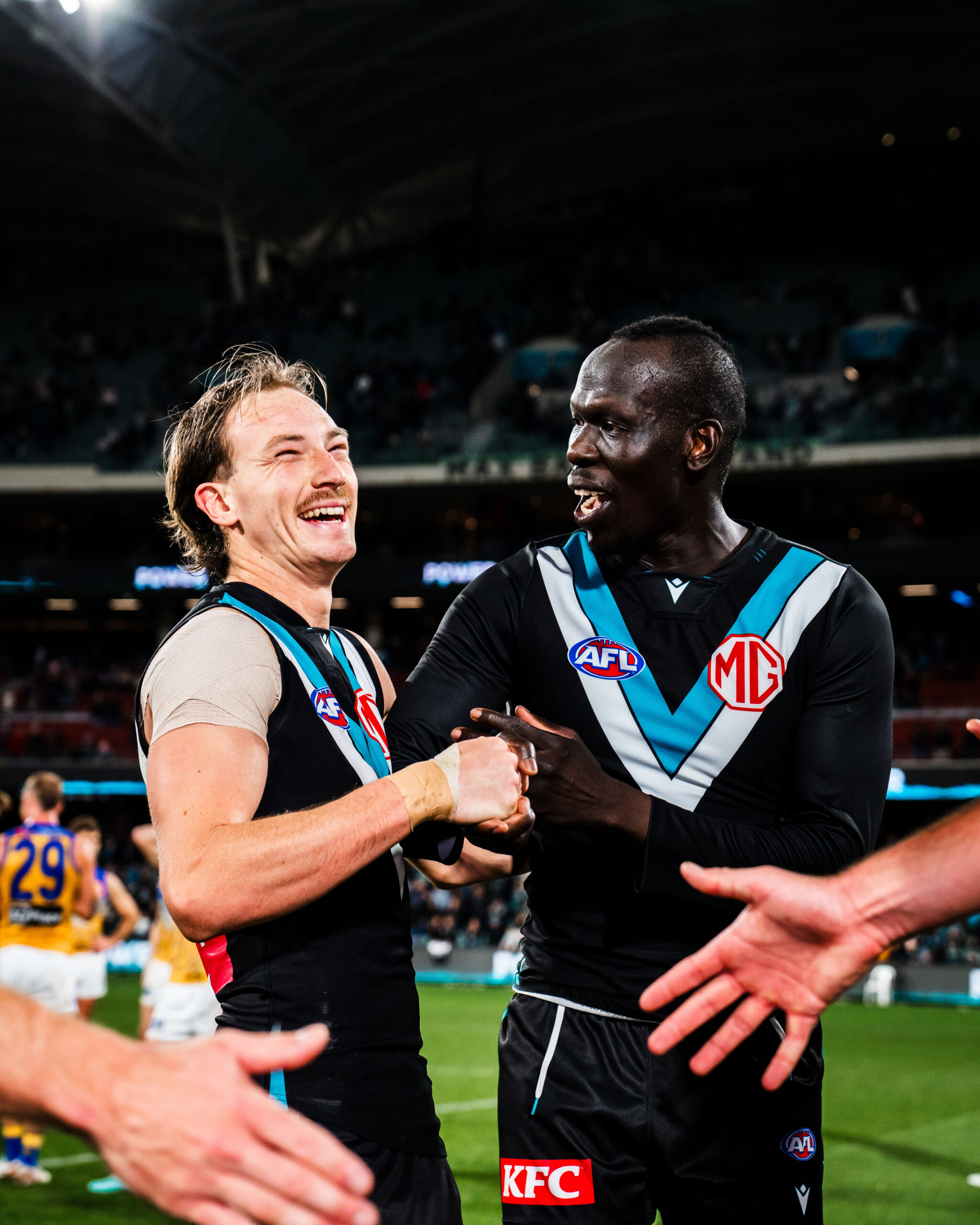

“I think it’s good to try multiple trades,” Liddy says. “That’s what I did, and it helped me get a feel for it. It might cost you a week or two worth of pay, but at the end of the day you get to experience something new, and you’ll be able to find something that makes you happy.
“Being a chippie or a tiler didn’t really make me happy – it was a bit repetitive – whereas being a fridgie you get a mix up every day, which I really liked.”
And while life as a fridgie might not provide quite as much happiness as being a professional footballer, it’s a pretty close second for Mani Liddy.
This story is the cover feature for HVAC&R News August–September 2025. Photo credit for main image: Brooke Bowering.
PREV
NEXT
Comments
Advertisements
Recent news
- Updates to NABERS embodied carbon
- Like shelling pea(nut)s: UNSW researchers make graphene breakthrough
- The path ahead for the VEU – industry webinars
Latest events
- The path ahead for the VEU – industry webinars
- Additional keynote announced for HVAC26
- PSO to host focus groups at AIRAH Hobart Industry Night
 Nick Johns-Wickberg
Nick Johns-Wickberg

Leave a Reply